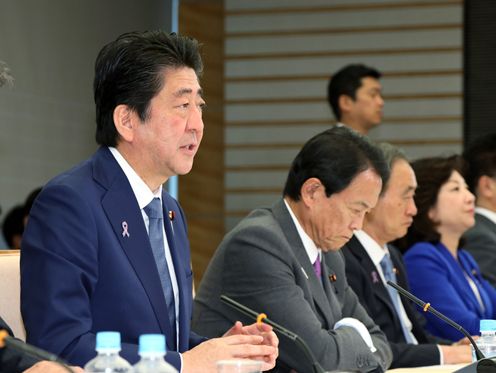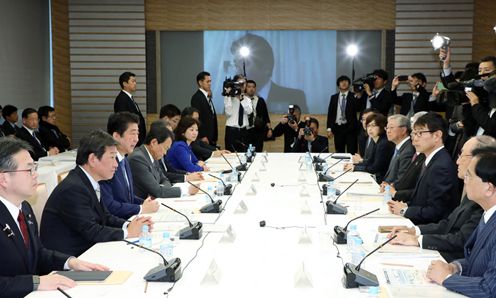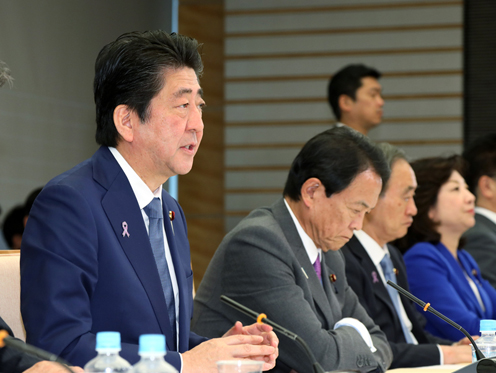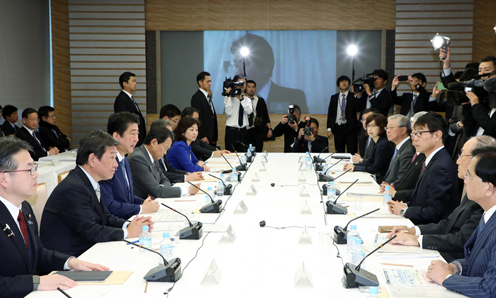Home > News > The Prime Minister in Action > November 2017 > Council on Investments for the Future
The Prime Minister in Action
Council on Investments for the Future
November 17, 2017

Photograph of the Prime Minister making a statement (1)

Photograph of the Prime Minister making a statement (2)
On November 17, 2017, Prime Minister Shinzo Abe held the 12th meeting of the Council on Investments for the Future at the Prime Minister’s Office.
At the meeting, there was discussion on the productivity revolution.
Based on the discussion, the Prime Minister said,
“We must implement bolder policies than ever before in order to encourage strong investments by the private sector in human resources and facilities toward the realization of a productivity revolution by the grand goal of 2020.
We will establish an environment in which companies that are proactively raising wages and making capital investments can fully compete in the global marketplace. In particular, we will provide an environment in which companies undertaking bold endeavors in innovative technology and business are able to resolutely overcome the international competition. On the other hand, through the use of corporate governance reforms and various policy tools, we will encourage decisive management decisions to be made by companies that are unmotivated in raising wages and making capital investments despite the highest level of corporate profits ever.
I would like to consider bold, focused policies, including on the tax system. In particular, amidst the large improvement in the employment situation, an issue for the Government is improving productivity at small- and medium sized enterprises (SMEs) facing personnel shortages. Through to the present, the Abe Cabinet has been supporting aggressive investments by SMEs, including by halving fixed asset taxes. Additionally, I want to create bold support measures that include unprecedented tax systems, the supplementary budget, and other matters, in order to support owners of SMEs who undertake endeavors like investments despite difficult business environments such as being in the red. I want to spread the wave of economic recovery to every corner of Japan by building management environments in which wage increases are possible even at SMEs.
The key to the productivity revolution will be realizing innovation. We are advancing grand reforms for systems that will create innovation, including governance reforms at universities, which are innovation hubs, and bold allocations of government resources to young researchers. The fourth industrial revolution is now giving rise to a series of new businesses all around the world. We must advance daring regulatory and structural reforms that will keep us ahead of modern trends. We are promoting structural reforms in line with the Society 5.0 era, including the opening of frequency bands through technological innovation, the construction of shared platforms for the integration of big data, and the opening of public data. Alongside regulatory reforms in individual fields, we will create regulatory sandbox frameworks in order to connect businesses with unprecedented, innovative ideas. To that end, I would like everyone to support preparations toward the submission of bills to the next ordinary session of the Diet. By promoting reforms, I want to create a Japan that draws people who want to start businesses from all over the world.
Japan will be the first in the world to realize the productivity revolution. I want to implement unprecedented, bold policies on tax, budget, and regulatory reform to make that possible. I request that each minister advance the realization of measures toward the decision on the economic policy package next month under this overarching policy.”
At the meeting, there was discussion on the productivity revolution.
Based on the discussion, the Prime Minister said,
“We must implement bolder policies than ever before in order to encourage strong investments by the private sector in human resources and facilities toward the realization of a productivity revolution by the grand goal of 2020.
We will establish an environment in which companies that are proactively raising wages and making capital investments can fully compete in the global marketplace. In particular, we will provide an environment in which companies undertaking bold endeavors in innovative technology and business are able to resolutely overcome the international competition. On the other hand, through the use of corporate governance reforms and various policy tools, we will encourage decisive management decisions to be made by companies that are unmotivated in raising wages and making capital investments despite the highest level of corporate profits ever.
I would like to consider bold, focused policies, including on the tax system. In particular, amidst the large improvement in the employment situation, an issue for the Government is improving productivity at small- and medium sized enterprises (SMEs) facing personnel shortages. Through to the present, the Abe Cabinet has been supporting aggressive investments by SMEs, including by halving fixed asset taxes. Additionally, I want to create bold support measures that include unprecedented tax systems, the supplementary budget, and other matters, in order to support owners of SMEs who undertake endeavors like investments despite difficult business environments such as being in the red. I want to spread the wave of economic recovery to every corner of Japan by building management environments in which wage increases are possible even at SMEs.
The key to the productivity revolution will be realizing innovation. We are advancing grand reforms for systems that will create innovation, including governance reforms at universities, which are innovation hubs, and bold allocations of government resources to young researchers. The fourth industrial revolution is now giving rise to a series of new businesses all around the world. We must advance daring regulatory and structural reforms that will keep us ahead of modern trends. We are promoting structural reforms in line with the Society 5.0 era, including the opening of frequency bands through technological innovation, the construction of shared platforms for the integration of big data, and the opening of public data. Alongside regulatory reforms in individual fields, we will create regulatory sandbox frameworks in order to connect businesses with unprecedented, innovative ideas. To that end, I would like everyone to support preparations toward the submission of bills to the next ordinary session of the Diet. By promoting reforms, I want to create a Japan that draws people who want to start businesses from all over the world.
Japan will be the first in the world to realize the productivity revolution. I want to implement unprecedented, bold policies on tax, budget, and regulatory reform to make that possible. I request that each minister advance the realization of measures toward the decision on the economic policy package next month under this overarching policy.”


